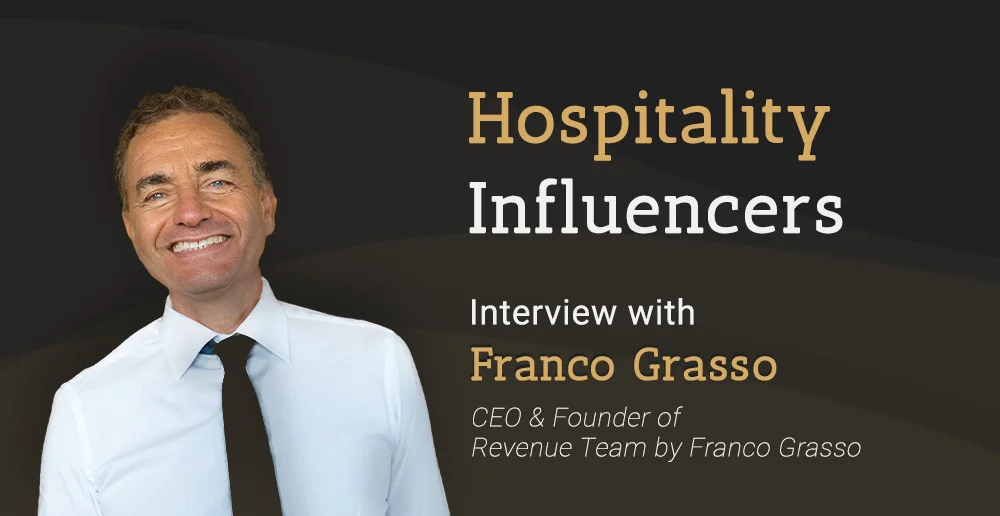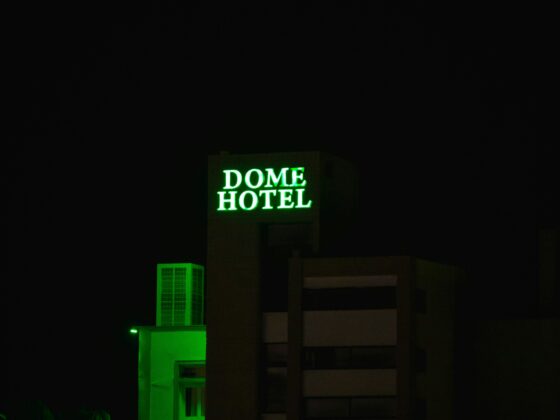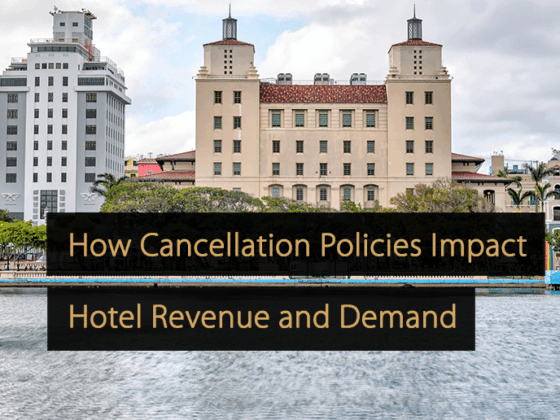
What was your first job in the hospitality industry?
My first job was in Rome in September 1981, working as a luggage porter in a 4-star hotel near Via Veneto. I had just graduated and simply needed the money. Although I initially took the job solely for financial reasons, I quickly fell in love with the vibrant and dynamic environment.
It was a small world, both closed and open, teeming with people and life. I began to admire the impeccably dressed gentlemen behind the desk who spoke numerous foreign languages and received generous tips. It was love at first sight.
What triggered you to start your company?
I disagreed with the prevailing approach to price differentiation, within what was then known as hotel yield management, from the very beginning. Hoteliers would create restrictions or ad hoc situations, such as offering rooms with special services, to justify price changes. Then discounts were applied sporadically and only under specific conditions.
I realized that this method of managing rates wasn’t conducive to aligning supply and demand in the market. It merely reflected the hoteliers’ convictions, which were often disconnected from market realities.
There was a need to liberate pricing strategies, allowing rates to be driven solely by market conditions. The constantly changing factors of reservation lead times and room availability necessitate a responsive pricing strategy that can freely fluctuate. Rates should not be justified by anything other than the current market situation. After all, the market itself is the only valid justification for any rate adjustments.
What is the story behind your company?
I stumbled upon the field of revenue management in 2000, sparking a deep curiosity within me. From that moment on, I dedicated myself to studying, understanding, and internalizing its intricacies. I often found myself at odds with some perspectives, but I remained captivated by the subject matter. I gradually forged my own approach to revenue management.
I embarked on a journey as a global trainer to disseminate my understanding. I spent approximately 150 days on the road each year, supported solely by my wife Carla. She played the role of both assistant and confidante for me. My training sessions targeted hoteliers in Italy and beyond, spanning roughly twenty countries. Teaching others only served to deepen my comprehension.
In 2005, convinced of the validity of my methods, I resolved to put them to the test within an actual hotel setting. I enlisted the help of my friend Fanco Laico and we embarked on the venture. It proved to be a resounding success and paved the way for approximately 3000 similar endeavors since then.
In 2006, I published my first book on revenue management, the inaugural work of its kind in Italy, titled “Hotel Revenue Management.” This publication, one of three I have authored. It not only became a bestseller but continues to maintain its relevance today. The book is one of the earliest contributions to the field in Europe.
Our firm presently stands as the largest hotel revenue management consulting entity in Europe. It’s a fact that fills me with immense pride. Yet, our journey is far from over, as we remain steadfast in our commitment to advancing the field.
What does your company solve?
The primary objective of my company, Revenue Team by Franco Grasso, is to assist hoteliers in maximizing their revenue through optimized hotel room sales while promoting efficiency and quality. Quality is paramount in effectively implementing revenue management strategies. Leveraging technology and conducting thorough hotel assessments, we devise optimal pricing strategies tailored to each establishment.
These strategies are then communicated to decision-makers, and we continuously monitor booking patterns, dynamically adjusting rates as needed. Our compensation is tied to the results achieved through a success fee model. This process ensures our clients’ satisfaction with tangible outcomes.
How do you describe the value of revenue management to a new client?
The value of revenue management applications is measured in various economic, social, and ethical dimensions. Effective revenue management enables entrepreneurs to achieve maximum occupancy at the highest possible rates, thereby generating the greatest profit. To achieve this, they must align with market trends and technology, bridging any gaps in their know-how.
Increased revenue translates to greater personal and professional stability for the hotel entrepreneur. This also facilitates strategic decisions such as investing in the business and hiring more staff. The influx of tourists boosts the local economy, creating a positive economic ripple effect.
Dynamic pricing can also offer more affordable rates at times. This makes travel more accessible to a broader audience and provides a significant social benefit. During other times of high demand, it can ensure higher rates that guarantee bookings for hoteliers. Likewise, availability for last-minute and latecomer travelers even closer to the arrival date.
To understand the broader positive impact of revenue management, one simply needs to multiply these benefits across all hotels that implement it. Revenue management is an economic force with the potential to influence various sectors: you only need to decide whether to ride the wave or be overwhelmed by it.
Based on your extensive experience in the industry, what are the key revenue management strategies you believe every hotelier should implement to maximize their revenue potential consistently?
I would start with an assessment of the previous year’s performance, focusing on how commercial channels and price ranges have been utilized. This includes both their breadth and the responsiveness with which they have been managed. For example, observing practices such as closing booking portals many days in advance, imposing restrictions like minimum stay requirements or non-refundable rates, and maintaining narrow price ranges can provide valuable insights into areas for improvement.
Establishing accurate initial rates is crucial, contributing to roughly 40% of the final outcome. The remaining 60% is driven by the art of dynamic pricing, which requires particular skills and sophistication, especially during the high season. Contrary to what many believe this is when the most significant mistakes are often made. And it results in substantial revenue loss.
A daily review with a 365-day window is essential to ensure optimal performance. This comprehensive analysis represents the critical starting point for effective revenue management.
What are some of the biggest challenges hotels face today regarding revenue management?
The great challenge of revenue management today, contrary to what one might think, is not economic but cultural. Embracing revenue management fully and without preconceptions means opening up to an infinite market governed by a small number of strict rules.
The real challenge for entrepreneurs will be to change their perspective, liberate themselves from the constraints of the old market, and face the new millennium with a free and conscious spirit. Few rules and certainties—that’s the real challenge! Revenue management is not a matter of agreement or disagreement; it’s about understanding and adhering to the market’s rules. One can achieve fantastic results by doing so. The choice is yours.
How do you stay updated with the latest revenue management trends and advancements in the hospitality industry? And which trends are you most excited about?
Our team of approximately 40 individuals, aged between 25 and 40, are deeply devoted to technology and its application. Our RMS Revolution Plus, an AI-driven software, has been meticulously honed and trained. All through the expertise of our seasoned revenue managers to ensure optimal performance.
This cutting-edge platform allows us to monitor the performance of over 600 hotels worldwide and maintain a keen pulse on market dynamics. Our revenue managers possess an intuitive understanding that minimizes errors in decision-making and is backed by our team’s wealth of experience.
We’re committed to staying abreast of the latest IT tools, particularly channel managers and PMS. We continually enhance our interfaces and automation through our IT sector. This dedication ensures that our consultations with hotels are not only faster but also more effective.
Where do you see the field of revenue management heading in the next 5-10 years?
The hospitality industry is undergoing a rapid and profound transformation. Personally, I hold the belief that much of what we presently deem relevant will inevitably evolve or even cease to exist in the near future. Booking channels may undergo significant shifts or distortions, potentially leading to a scenario where each individual organizes their own trips directly from a screen, bypassing intermediaries entirely.
However, amidst this evolving landscape, I firmly believe that two constants will endure: the crucial role of optimal pricing strategies and the enduring significance of maintaining the high-quality standards of online consumers.
These two factors will likely remain pivotal for the foreseeable future and will shape the dynamics of the industry in the years to come. Rest assured, we will be at the forefront, setting the standards and ensuring maximum outcomes for all involved.







